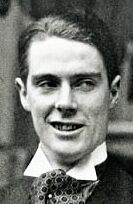
Anthony Dymoke Powell was an English novelist best known for his 12-volume work A Dance to the Music of Time, published between 1951 and 1975. It is on the list of longest novels in English.
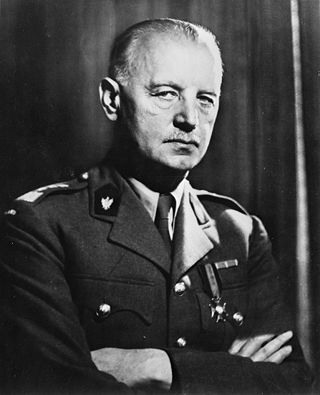
Władysław Eugeniusz Sikorski was a Polish military and political leader.

Józef Mackiewicz was a Polish writer, novelist and political commentator; best known for his documentary novels Nie trzeba głośno mówić, and Droga donikąd. He staunchly opposed communism, referring to himself as an "anticommunist by nationality". Mackiewicz died in exile. His older brother Stanisław Mackiewicz was also a writer.

Around six million Polish citizens are estimated to have perished during World War II. Most were civilians killed by the actions of Nazi Germany, the Soviet Union, the Lithuanian Security Police, as well as the Organization of Ukrainian Nationalists and its offshoots.
A Dance to the Music of Time is a 12-volume roman-fleuve by English writer Anthony Powell, published between 1951 and 1975 to critical acclaim. The story is an often comic examination of movements and manners, power and passivity in English political, cultural and military life in the mid-20th century. The books were inspired by the painting of the same name by French artist Nicolas Poussin.

The Polish government-in-exile, officially known as the Government of the Republic of Poland in exile, was the government in exile of Poland formed in the aftermath of the Invasion of Poland of September 1939, and the subsequent occupation of Poland by Germany, the Soviet Union, and the Slovak Republic, which brought to an end the Second Polish Republic.
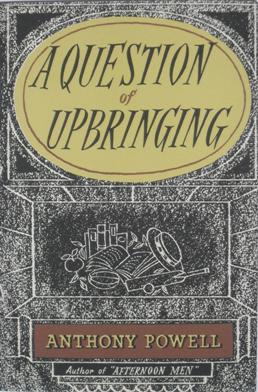
A Question of Upbringing is the opening novel in Anthony Powell's A Dance to the Music of Time, a twelve-volume cycle spanning much of the 20th century.

Stanisław Swianiewicz was a Polish economist and historian. A veteran of the Polish-Soviet War, he was during World War II a survivor of the Katyn massacre and an eyewitness of the transport of Polish prisoners-of-war to the forests outside Smolensk by the NKVD.

A Buyer's Market is the second novel in Anthony Powell's twelve-novel series A Dance to the Music of Time. Published in 1952, it continues the story of narrator Nick Jenkins with his introduction into society after boarding school and university.

At Lady Molly's is the fourth volume in Anthony Powell's twelve-novel sequence, A Dance to the Music of Time. Winner of the James Tait Black Memorial Prize 1957, At Lady Molly's is set in England of the mid-1930s and is essentially a comedy of manners, but in the background, the rise of Hitler and of worldwide Fascism are not ignored. The driving theme of At Lady Molly's is married life; marriages – as practised or mooted – among the narrator's acquaintances in bohemian society and the landed classes are pondered. Meanwhile, the career moves of various characters are advanced, checked or put on hold.

The Valley of Bones is the seventh novel in Anthony Powell's twelve-volume series A Dance to the Music of Time. Published in 1964, it is the first of the war trilogy.

The Soldier's Art is the eighth novel in Anthony Powell's twelve-volume masterpiece A Dance to the Music of Time, and the second in the war trilogy. The title is from the poem by Robert Browning, Childe Roland to the Dark Tower Came, fifth line, “think first, fight afterwards – the soldier’s art.”

Books Do Furnish a Room is a novel by Anthony Powell, the tenth in the twelve-novel sequence A Dance to the Music of Time. It was first published in 1971 and, like the other volumes, remains in print.

Hearing Secret Harmonies is the final novel in Anthony Powell's twelve-volume series, A Dance to the Music of Time. It was published in 1975, twenty-four years after the first book, A Question of Upbringing, appeared in 1951. No other novel series is based on the formal pictorial principles as A Dance to the Music of Time. The book ends with a torrential passage from The Anatomy of Melancholy by Robert Burton.
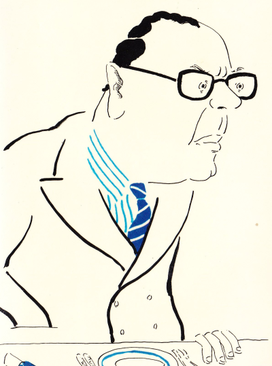
Kenneth Widmerpool is a fictional character in Anthony Powell's novel sequence A Dance to the Music of Time, a 12-volume account of upper-class and bohemian life in Britain between 1920 and 1970. Regarded by critics as one of the more memorable characters of 20th century fiction, Widmerpool is the antithesis of the sequence's narrator-hero Nicholas Jenkins. Initially presented as a comic, even pathetic figure, he becomes increasingly formidable, powerful and ultimately sinister as the novels progress. He is successful in business, in the army and in politics, and is awarded a life peerage. His only sphere of failure is his relationships with women, exemplified by his disastrous marriage to Pamela Flitton. The sequence ends with Widmerpool's downfall and death, in circumstances arising from his involvement with a New Age-type cult.
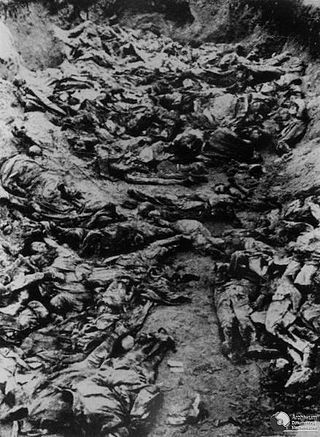
The Katyn massacre was a series of mass executions of nearly 22,000 Polish military officers and intelligentsia prisoners of war carried out by the Soviet Union, specifically the NKVD in April and May 1940. Though the killings also occurred in the Kalinin and Kharkiv prisons and elsewhere, the massacre is named after the Katyn forest, where some of the mass graves were first discovered by German Nazi forces.
As a result of the Soviet invasion of Poland in 1939, hundreds of thousands of Polish soldiers became prisoners of war. Many of them were executed; 22,000 Polish military personnel and civilians perished in the Katyn massacre alone.
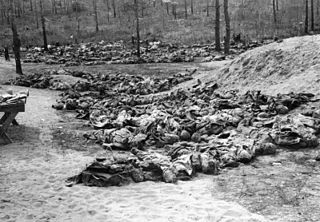
In the aftermath of the German and Soviet invasion of Poland, which took place in September 1939, the territory of Poland was divided in half between Nazi Germany and the Soviet Union. The Soviets had ceased to recognise the Polish state at the start of the invasion. Since 1939 German and Soviet officials coordinated their Poland-related policies and repressive actions. For nearly two years following the invasion, the two occupiers continued to discuss bilateral plans for dealing with the Polish resistance during Gestapo-NKVD Conferences until Germany's Operation Barbarossa against the Soviet Union, in June 1941.
A Dance to the Music of Time is a British four-part television drama series based on the book series of the same name by Anthony Powell. The series was also written by Anthony Powell with Hugh Whitemore as co-writer. The series was produced by Table Top Productions and directed by Christopher Morahan and Alvin Rakoff. It was first broadcast on Channel 4 on 9 October 1997 over four consecutive weeks.
This is a select bibliography of English language books and journal articles about the history of Poland during World War II. A brief selection of English translations of primary sources is included. Book entries have references to journal articles and reviews about them when helpful. Additional bibliographies can be found in many of the book-length works listed below; see Further Reading for several book and chapter-length bibliographies. The External Links section contains entries for publicly available select bibliographies from universities. This bibliography specifically excludes non-history related works and self-published books.
















